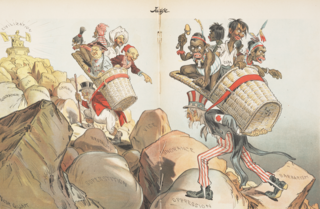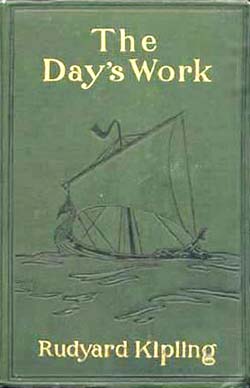
Joseph Rudyard Kipling was an English journalist, novelist, poet, and short-story writer. He was born in British India, which inspired much of his work.
This is a bibliography of works by Rudyard Kipling, including books, short stories, poems, and collections of his works.

"If—" is a poem by English poet Rudyard Kipling (1865–1936), written circa 1895 as a tribute to Leander Starr Jameson. It is a literary example of Victorian-era stoicism. The poem, first published in Rewards and Fairies (1910) following the story "Brother Square-Toes", is written in the form of paternal advice to the poet's son, John.

A ship's tender, usually referred to as a tender, is a boat or ship used to service or support other boats or ships. This is generally done by transporting people or supplies to and from shore or another ship.

Just So Stories for Little Children is a 1902 collection of origin stories by the British author Rudyard Kipling. Considered a classic of children's literature, the book is among Kipling's best known works.
Stalky & Co. is a novel by Rudyard Kipling about adolescent boys at a British boarding school. It is a collection of school stories whose three juvenile protagonists display a know-it-all, cynical outlook on patriotism and authority. It was first published in 1899 after the stories had appeared in magazines during the previous two years. It is set at a school dubbed "the College" or "the Coll.", which is based on the actual United Services College that Kipling attended as a boy.
Sir Andrew Barton was a Scottish sailor from Leith. He gained notoriety as a privateer, making raids against Portuguese ships. He was killed in battle and memorialised in English and Scottish folk songs.

"The White Man's Burden" (1899), by Rudyard Kipling, is a poem about the Philippine–American War (1899–1902) that exhorts the United States to assume colonial control of the Filipino people and their country. Originally written to celebrate the Diamond Jubilee of Queen Victoria, the jingoistic poem was replaced with the sombre "Recessional" (1897), also a Kipling poem about empire.
".007" is a short story by Rudyard Kipling. It is a story in which steam locomotives are characters, somewhat like the later, better-known tales of The Railway Series by Wilbert Awdry and his son.

"Recessional" is a poem by Rudyard Kipling. It was composed for the Diamond Jubilee of Queen Victoria, in 1897.

Plain Tales from the Hills is the first collection of short stories by Rudyard Kipling. Out of its 40 stories, "eight-and-twenty", according to Kipling's Preface, were initially published in the Civil and Military Gazette in Lahore, Punjab, British India between November 1886 and June 1887. "The remaining tales are, more or less, new."

The Day's Work is a collection of short stories by Rudyard Kipling. It was first published in 1898. There are no poems included between the different stories in The Day's Work, as there are in many other of Kipling's collections.

In Black and White is a collection of eight short stories by Rudyard Kipling which was first published in a booklet of 108 pages as no. 3 of A H Wheeler & Co.’s Indian Railway Library in 1888. It was subsequently published in a book along with nos 1 and 2, Soldiers Three (1888) and The Story of the Gadsbys, as Soldiers Three (1899). The characters about whom the stories are concerned are native Indians, rather than the British for writing about whom Kipling may be better known; four of the stories are narrated by the Indians, and four by an observant wise English journalist. The stories are:
"Lispeth" is a short story by Rudyard Kipling. It was first published in the Civil and Military Gazette on 29 November 1886; its first appearance in book form was in the first Indian edition of Plain Tales from the Hills in 1888, and it later appeared in subsequent editions of that collection. The tale is an interesting example of Kipling's attitudes to different races and cultures, which is less simple than many accounts of his beliefs allow.

"The King's Pilgrimage" is a poem and book about the journey made by King George V in May 1922 to visit the World War I cemeteries and memorials being constructed at the time in France and Belgium by the Imperial War Graves Commission. This journey was part of the wider pilgrimage movement that saw tens of thousands of bereaved relatives from the United Kingdom and the Empire visit the battlefields of the Great War in the years that followed the Armistice. The poem was written by the British author and poet Rudyard Kipling, while the text in the book is attributed to the Australian journalist and author Frank Fox. Aspects of the pilgrimage were also described by Kipling within the short story "The Debt" (1930).
"The Ship that Found Herself" is a short story by Rudyard Kipling, first published in The Idler in 1895. It was collected with other Kipling stories in The Day's Work (1898).
"The Devil and the Deep Sea" is a short story by the British writer Rudyard Kipling, first published in 1895 in The Graphic's Christmas number. It was collected with other Kipling stories in The Day's Work (1898).

"A Matter of Fact" is a short story by Rudyard Kipling, first appearing in January 1892 in the magazine People. It was published the next year in the collection Many Inventions.
"McAndrew's Hymn" is a poem by English writer Rudyard Kipling (1865–1936). It was begun in 1893, and first published in December 1894 in Scribner's Magazine. It was collected in Kipling's The Seven Seas of 1896. Some editions title the poem "M'Andrew's Hymn".
"The Mary Gloster" is a poem by British writer Rudyard Kipling (1865-1936). It is dated 1894, but seems to have been first published in his 1896 collection The Seven Seas.











